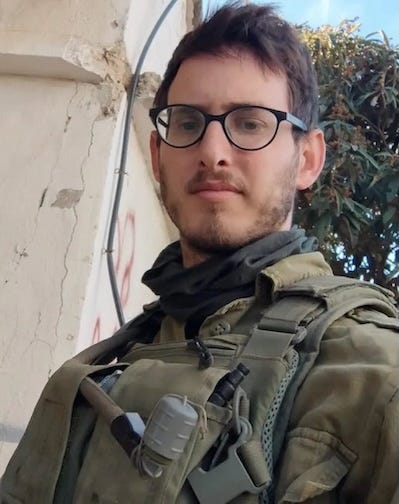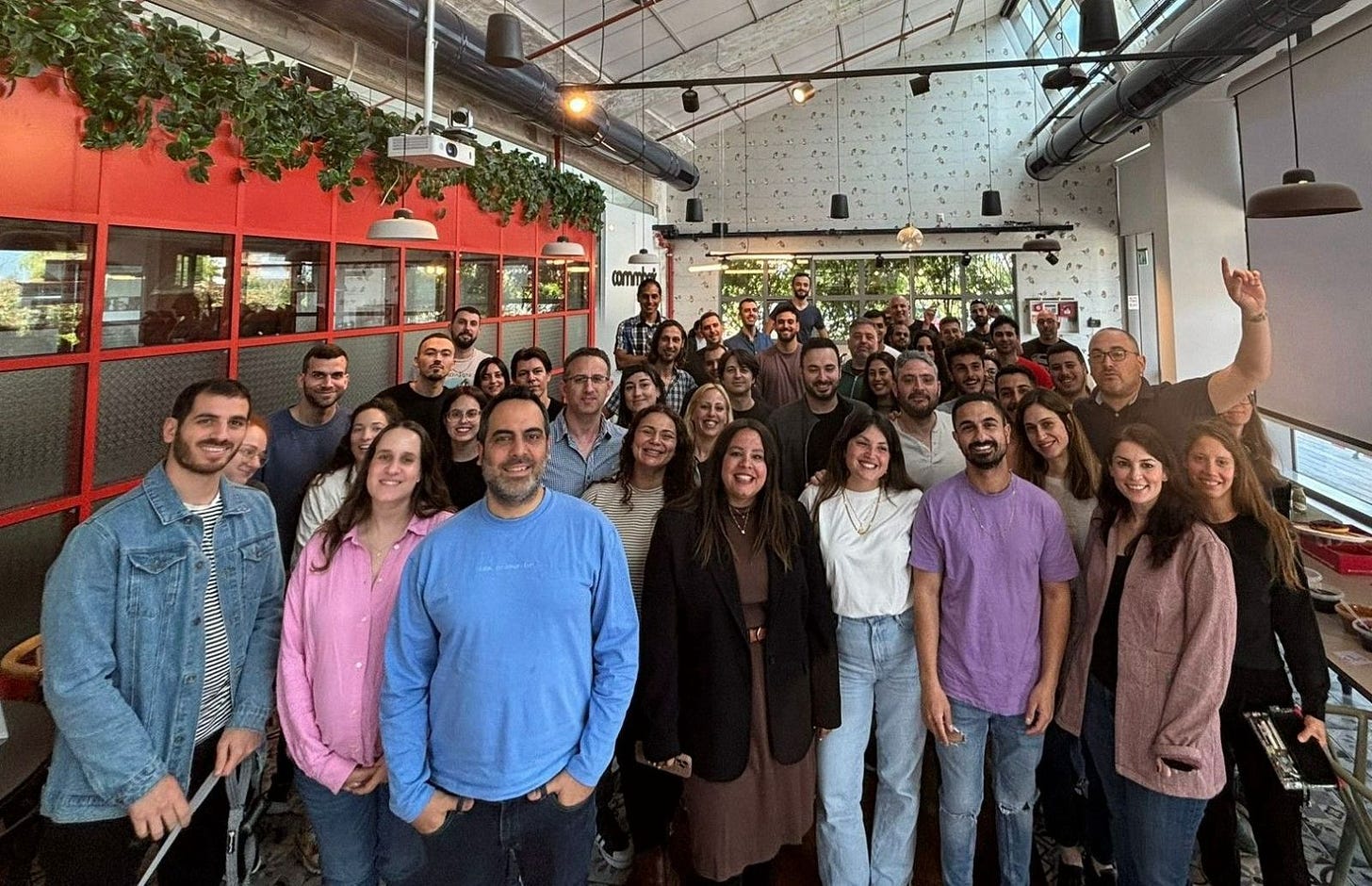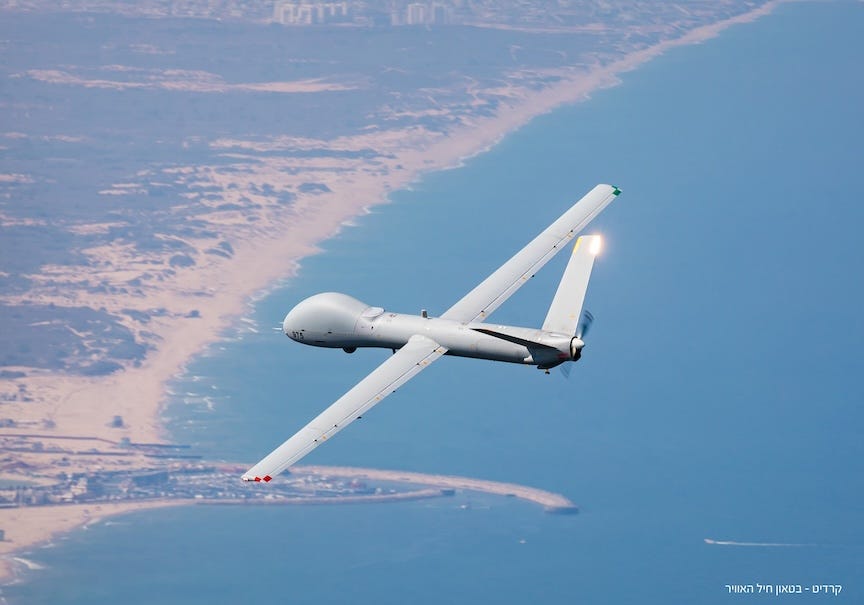DAY 410 OF THE WAR: Soldiers Killed in Lebanon, Hochstein Attempts to Mediate Ceasefire, Humanitarian Aid to Gaza, Defense Budget—Part III, Israel’s Super Computer
Tel Aviv Diary, November 19, 2024
Today, all eyes were focused on the North, both in terms of negotiations and ongoing combat. We suffered another tragic loss this afternoon when another soldier fell in Lebanon. Sergeant First Class (res.) Omer Moshe Gealdor (30), from Jerusalem, a member of the Golani Brigade, was killed during an operation in Southern Lebanon, when Hezbollah targeted his unit with a suicide drone. Additionally, three other soldiers sustained serious injuries in the attack. Meanwhile, Hezbollah’s rocket attacks on Israel continued throughout the day.
One barrage targeted central Israel, triggering sirens in Herzliya, although the rockets did not reach Tel Aviv. In Kfar Yona, two people were lightly injured by falling debris from a rocket interceptor. The North experienced intense rocket fire, with 25 rockets striking Carmiel. One rocket directly hit a home, injuring a woman. The usual towns and villages along the border routinely faced repeated shelling from Lebanon.
CEASEFIRE NEGOTIATIONS WITH LEBANON/HEZBOLLAH
Today, American envoy Amos Hochstein, was in Beirut for meetings with Lebanese officials. Hochstein described an agreement as being “within our grasp”. However, the exact proximity of “almost” remains uncertain. Speculation grew when Hezbollah’s leader unexpectedly canceled a planned speech this afternoon. Some interpret this cancellation as a sign of an unresolved agreement, but currently, it is all conjecture.
HAMAS, HUMANITARIAN AID, AND GOVERNANCE IN GAZA
In Northern Gaza, fighting remains fierce. Despite reports suggesting that Hamas’s morale has been shattered following the killing of Yahya Sinwar, the ongoing intense battles in a relatively confined area, coupled with considerable casualties on our side, suggest otherwise.
UNRWA publicly reported today that over the weekend, armed militants—specifically Hamas— seized 90 of the 100 aid trucks entering Gaza. This issue has plagued the war effort since the beginning, raising urgent questions about how to address the problem effectively. Somewhat surprisingly, Finance Minister Smotrich acknowledged this failure, highlighting that the ineffective distribution of aid represents a major shortcoming of the war effort. Critics suggest that Smotrich’s stance stems from his desire to establish a military administration in Gaza, which they believe is a precursor to the founding of future settlements. Conversely, others argue that aid distribution by the IDF could directly endanger soldiers’ lives, raising the question of how the government could justify such risks to the grieving families of any soldiers critically wounded or killed in the process.
While I firmly oppose the establishment of a military government in Gaza, ensuring that aid reaches the civilians and preventing Hamas from profiting by reselling that aid, is a crucial military objective. The actions Israel has taken in Gaza merits a separate discussion, but ensuring that civilians have access to food and depriving Hamas of resources is equally—if not more, important—than eliminating every last Hamas fighter.
The failure to handle the food crisis in Gaza underscores a broader issue—our lack of a coherent strategy that extends beyond targeting Hamas. This failure highlights the urgent need for a comprehensive strategic plan that not only addresses military objectives but also considers the humanitarian and strategic aspects of the conflict.
QUESTIONS REGARDING LAST NIGHT’S ATTACK
The two major attacks last night raise several pressing questions. The woman killed in Shfaram was indeed inside her safe room at the time she was killed. However, it remains uncertain whether the safe room was constructed to the necessary safety standards, or if the rocket—which was particularly heavy with 100 kg of explosives—was simply powerful enough to breach it.
The missile strike in Ramat Gan/B’nei Brak last night raised many questions. In the hour before I posted last night’s diary, I revised my account of the events three times as new reports emerged. Initially, the Army stated that only fragments of an interceptor had fallen.
However, upon the arrival and assessment of police and other officials at the scene, it became apparent that the damage involved was far more extensive than just falling fragments. It was later revealed that David’s Sling had intercepted the missile at an altitude of 12 kilometers, but was not completely destroyed. Instead, the missile split in two, and the portion containing most of the explosives fell directly to the ground, striking the location in Ramat Gan/B’nei Brak.
THE DEFENSE BUDGET— PART III
Earlier this week, Sharon Kidon conducted a fascinating interview on Ynet's daily podcast, focusing on the Defense budget with Brigadier General (Res.) Re’em Aminoach, former head of the IDF budget department. I shared the initial portions of the interview yesterday and the day before. In this final segment of the interview, Kidon begins by posing the question of whether Israel needs a separate missile force, as Defense Minister Lieberman once attempted to establish.
Sharon Kidon with Brigadier General (Res.) Re’em Aminoach:
I think we do need to establish a missile corps, but it shouldn’t replace anything; it should complement. You say unequivocally, clearly—you see the fight. Suppose they launch missiles from Iran and planes attack from another direction. Part of the advantage of planes, for instance, is that they can approach the target; it’s harder to intercept them when they fire. Missiles, however, are harder to intercept once fired and take longer to reach their destination. There are multiple processes here, and I think we need a missile corps not because it’s superior to the air force, but because it complements it.
If you consider the lessons from the war in October, without diving into all of them, one key point is evident. People debate whether certain systems are effective. Some say the defense systems are good, others disagree. I’d argue they performed excellently, but when it comes to defending critical assets, like the Jewish sovereignty in Israel—which took 2,000 years to regain after losing it—we can’t afford to rely on just one layer of defense.
We need multiple defensive layers, but these layers must be diverse. If all the layers are identical, an enemy breakthrough in one layer could also compromise the others. This is why we strive for diversity in our defensive systems, which is reflected in the various levels of our air defense. For example, the upcoming “Iron Beam” system might even replace some existing systems, showcasing the evolutionary nature of the Army’s needs.
Reliance on reservists
Another critical point is the cost and reliance on reservists. This ties into the exemption law and broader military policy. Many reservists, including those the age of my children, leave their jobs and families to serve. They’re compensated, which is a good thing, but there are issues for self-employed individuals who face significant financial challenges.
Employers, too, bear the burden. Many aren’t reimbursed adequately for the losses caused by their employees being called up for reserve duty. On average, employers are reimbursed about 30% of their losses, which isn’t sustainable. For smaller businesses—like a company with 20 workers—losing six employees to reserve duty can be devastating. Without proper compensation, this creates resentment.
Haredim and military service
Now let’s talk about the Haredi (ultra-Orthodox) community. Exempting Haredim from military service and allowing them to remain in yeshivas creates a significant economic burden. If this trend continues, Israel won’t survive—neither socially nor economically. The Haredim’s lack of participation in the workforce and the military means the state must fund their livelihoods, costing approximately 150 billion shekels annually—double the defense budget.
Since 1977, Israel has essentially forced Haredim to stay in yeshivas by threatening conscription if they leave. As a result, many spend 8+ years in study and never enter the workforce, perpetuating the cycle. All major rabbinical rulings throughout history have supported work and military service during times of war, yet this exemption policy persists.
Economically and socially, Israel cannot sustain this system. If Haredim joined the workforce and military, the state’s financial and societal outlook would change dramatically. Without this shift, we risk an unsustainable future, both as a society and in funding our national security.
Israel’s Ballooning Debt
I’ll explain it, carefully choosing my words. The State of Israel owes 1.2 trillion shekels in external debt. Last year, in 2023, Israel paid approximately 44 billion shekels in interest on this debt. This year, it will pay 50 billion, and in 2025, the amount is expected to rise to 57-58 billion shekels—just in interest, not even paying down the principal.
This is interest on the loans we’ve taken. Let me put it in relatable terms: imagine a person with a family who doesn’t have enough money and goes to the bank. He says to the banker, ‘Hello, I’d like a loan.’ The banker asks, ‘What do you need the loan for?’ The man replies, ‘I have debt at another bank, and I can’t pay it back, so I need this loan to pay them.’ That’s where we are. And what kind of loan would he get? Likely one with a high-interest rate.
The situation is such that the interest Israel is paying annually has risen by about 14 billion shekels in just one year, from last year to next. The debt itself hasn’t grown significantly, but the interest has. This is also reflected in the credit rating agencies, which now view us as riskier borrowers.
How will we pay this? It will likely come from defense spending, which is already ballooning, or from more loans. Over the next five years, I don’t see Israel having a single year where its revenues outpace its expenses. Back to the family analogy: the same man goes to the bank, and when the banker asks how he’ll repay the loan, the man replies, ‘I have no idea; my expenses are higher than my income.’ This is our reality, not just today but for the next five years unless significant changes are made.
On households and the financial burden
Households are also feeling the impact. People take loans and simply adjust, saying, ‘This will cost me more, but I have no choice; life goes on.’ Inflation adds to the burden, but they continue paying. The Ministry of Finance has calculated that for the average household, this situation will cost them an additional 4,000 shekels per year.
There are two options. One is to cut spending on education, healthcare, and countless other areas, making the population poorer and more vulnerable. The other is to cut defense spending. But reducing defense spending means leaving Israel in a state like it was during the October war.
Israel cannot afford to be a weak and poor state, especially in this region. The only reason we have survived here since 1948 is our strength—military, economic, and deterrent. Weakness in this neighborhood invites aggression.
On U.S. aid and defense spending
American aid is another critical factor. During Obama’s presidency, a major agreement restricted how much of the aid could be converted to shekels to support Israeli industries. This policy threatened to devastate our defense sector, but when Trump entered office, he corrected some of this damage, allowing us to convert a portion of aid back into local currency.
The recent war brought unprecedented U.S. aid commitments, totaling approximately 22 billion dollars, including emergency support. However, there’s often confusion about these numbers. For example, out of the 17.9 billion allocated for military aid during the war, 3.8 billion was part of the regular annual aid package. Additionally, about 5.4 billion was allowed to be converted to shekels—an unusual and highly beneficial move.
Conclusion
Looking ahead, the only way to ensure a responsible budget that protects Israel’s security interests is to integrate the Haredi (ultra-Orthodox) population into the workforce and military service. Without their participation, no budgetary framework will hold, and the numbers simply won’t add up. It’s not sustainable, and unless addressed, this issue will jeopardize Israel’s economic and national survival.
BUSINESS
Commbox
Israeli startup Commbox recently secured a substantial $15 million funding round, led by PSG, a prominent investor in their previous round. Commbox specializes in developing a comprehensive platform that enables companies to manage various customer communication channels. Founded in 2013, Commbox has grown to employ approximately 100 individuals across Israel, the United Kingdom, and the United States, collaborating with esteemed clients such as IKEA, Bank Leumi, Clalit Health Services, and Isracard.
The platform’s ingenuity lies in its ability to consolidate diverse customer messaging methods into a centralized platform, facilitating effective management by customer service teams. As elucidated by their CEO, Dvir Hoffmann, this solution addresses a significant challenge by integrating scattered customer conversations across various channels, eliminating the barriers to analysis and improvement.
Commbox has incorporated automation mechanisms to streamline customer interactions, enabling users to schedule appointments, renew insurance, and monitor package status independently. The system seamlessly integrates with companies’ customer relationship management (CRM) systems, empowering businesses to execute WhatsApp marketing campaigns, obtain digital signatures, and monitor the performance of their customer service operations.
In the context of 2024, Commbox has introduced AI-powered chatbots that possess the remarkable ability to comprehend and respond to natural text conversations, eliminating the need for coding expertise. These advanced chatbots transcend traditional capabilities, seamlessly operating across all communication channels, accessing the company’s internal data, and handling intricate tasks with utmost security.
Israel’s Super-Computer
In June 2015, Israel last appeared on the Top 500 list, the prestigious ranking of the world’s 500 most powerful supercomputers. At that time, an Israeli supercomputer ranked 429th, but since then, no Israeli system has made it onto the list—until now. This year, Israel-1, the Israeli supercomputer, has leaped to one of the highest rankings Israel has ever achieved.
At the SC24 conference in Atlanta, the updated Top 500 list was revealed on Monday and Israel-1, NVIDIA’s Israeli supercomputer, secured a spot on the list. The system was first announced during Computex 2023 in Taipei, and by November of the same year, several months ahead of schedule, it officially began operation.
Israel-1 Specifications:
In its initial phase, Israel-1 includes:
128 NVIDIA HGX H100 systems via Dell PowerEdge XE9680 servers.
1,024 H100 80GB GPUs.
Over 40 Spectrum-4 switches (developed in Israel).
1,280 NVIDIA BlueField-3 and SuperNIC chips, also developed at NVIDIA’s Israeli R&D center (formerly Mellanox).
This configuration brought Israel-1 to 34th place on the Top 500 list. However, it’s important to note that this ranking reflects only a portion of Israel-1. The submitted configuration includes 117 HGX H100 systems from Dell with 936 H100 80GB GPUs. Once completed, the full Israel-1 system will feature:
256 HGX H100 systems.
Over 34 million CUDA cores and 1 million 4th-generation Tensor cores.
2,560 BlueField-3 chips.
More than 80 Spectrum-4 switches.
When the system is fully operational or additional components are submitted for evaluation, Israel-1 is expected to climb even higher in the rankings.
In parallel, NVIDIA announced a partnership with Google’s Quantum AI team to accelerate the design of future quantum hardware. Using NVIDIA’s CUDA-Q system, this collaboration aims to simulate solutions that address the noise issue limiting quantum processors’ ability to perform consecutive operations. According to NVIDIA, this approach will reduce costs dramatically and deliver results in minutes rather than weeks.
Anthem
The American health giant Elevance Health (formerly Anthem) has unexpectedly announced the closure of its innovation center in Israel. Managed by Udi Guri and employing around 40 people, the center’s staff is now working to transition ongoing projects in Israel by the end of the year. This decision comes after six years of activity during which the center operated in the local digital health sector and helped Israeli startups break into the American market. Elevance Health is the only U.S. health insurance company operating in Israel.
Over the years, the innovation center collaborated with eight Israeli startups, assisting them in adapting their products to meet the demands and needs of the U.S. healthcare market. Among the companies supported were Tyto Health, K Health, MDI Health, VIM, and Diagnostic Robotics. For example, Tyto successfully integrated its product into tens of thousands of homes belonging to Elevance’s policyholders. In some cases, Elevance even made direct investments in these startups.
In the past year, the center launched an accelerator program for young startups, completing only one cohort. While recruitment for the next cohort had already begun, it now appears unlikely to proceed due to the anticipated closure. Additionally, the Israeli team conducted research activities and published professional papers on topics such as the efficacy of various drugs, including treatments for breast cancer.
The sharp rise in profits is partly attributed to the high credit loss provisions recorded in the corresponding quarter last year, which were made due to concerns over the implications of the war.
Elbit
Quarterly Results: Revenues in the third quarter of 2024 were $1,717.5 million, as compared to $1,501.6 million in the third quarter of 2023.
Aerospace revenues increased by 7% in the third quarter of 2024, as compared to the third quarter of 2023 mainly due to increased UAS sales in Israel. C4I and Cyber revenues increased by 13% in the third quarter of 2024 mainly due to radio systems and command and control systems sales. ISTAR and EW revenues increased by 13% mainly due to Electronic Warfare and Electro-Optic systems sales. Land revenues increased by 24% due to the increase in ammunition and munition sales in Israel. Elbit Systems of America revenues increased by 17% due to the increase in night-vision systems and medical instrumentation sales.
Non-GAAP(*) gross profit amounted to $419.4 million (24.4% of revenues) in the third quarter of 2024, as compared to $374.2 million (24.9% of revenues) in the third quarter of 2023. GAAP gross profit in the third quarter of 2024 was $412.8 million (24.0% of revenues), as compared to $367.2 million (24.5% of revenues) in the third quarter of 2023.
Research and development expenses, net were $119.9 million (7.0% of revenues) in the third quarter of 2024, as compared to $103.3 million (6.9% of revenues) in the third quarter of 2023.
Marketing and selling expenses, net were $91.3 million (5.3% of revenues) in the third quarter of 2024, as compared to $86.0 million (5.7% of revenues) in the third quarter of 2023.
General and administrative expenses, net were $75.7 million (4.4% of revenues) in the third quarter of 2024, as compared to $71.8 million (4.8% of revenues) in the third quarter of 2023.
Non-GAAP(*) operating income was $140.7 million (8.2% of revenues) in the third quarter of 2024, as compared to $120.0 million (8.0% of revenues) in the third quarter of 2023. GAAP operating income in the third quarter of 2024 was $125.8 million (7.3% of revenues), as compared to $106.1 million (7.1% of revenues) in the third quarter of 2023.
Financial expenses, net were $45.0 million in the third quarter of 2024, as compared to $35.7 million in the third quarter of 2023.
Taxes on income were $12.8 million in the third quarter of 2024, as compared to $10.0 million in the third quarter of 2023
.
∞–––––∞–––––∞–––––∞–––––∞–––––∞–––––∞–––––∞–––––∞–––––∞
“A PIECE OF HISTORY” will resume tomorrow.
My weekly radio show








>the Charedim are a full quarter of the annual Israeli budget
Hilariously wrong
Israel is not an islamic country. Please, make jerusalem the holy city be respected
Destroy that damn mosque that is occupying the place of the jerusalem temple, drop a bomb there., once for all
Thanks,
Fr ismael jose,